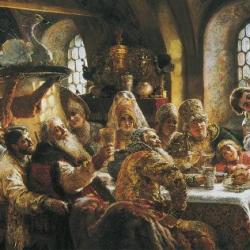 Philippians 1:1-11
Philippians 1:1-11
Among all of the other wonderful elements in The Lord of the Rings, it is perhaps a story more about fellowship than anything else. In fact, the second volume of the trilogy is called The Fellowship of the Ring. In that story, great fellowship takes place among many different kinds of creatures. If you know the story, you know that good wizards, men of old, elves, dwarves – and of course, the stay-at-home Hobbits – are all drawn together into one great fellowship to save Middle Earth.
Even the most unlikely of creatures find friendship and fellowship because this one common good has bound them together forever, and that common good transcends all of their differences.
But there is an even greater fellowship that takes place in God’s kingdom, one which could therefore be called not the “Fellowship of the Ring,” but “The Fellowship of the King.”
It’s this fellowship that St. Paul shows us this morning in Philippians 1.
As Christians, we’re supposed to have fellowship in the unity of the Spirit and a bond of peace that is so strong that others might say as they said of the early Christians, “How they love one another!” Sometimes we are creatures as different from one another as dwarves and elves, and yet the world should marvel at our unity, in spite of our differences in personality and experiences.
Our fellowship comes not from ourselves but flows from the fellowship we have with God our King, a fellowship we have in 3 ways: with His Person, in His purpose, and in His power. We have fellowship with God’s person, of course, through Jesus Christ. He is the King of kings, and if you’ve ever thought it might be a grand adventure to fight in Gandalf’s army then you might be glad to know that you are a part of Jesus Christ’s army (remember Ephesians 6 yesterday?)
This fellowship is much greater than in any other army, because we are saints in Jesus Christ (verse 1), whose affection we share (verse 8), and we are filled with the nourishing fruits of righteousness by Him (verse 11.)
Our fellowship in Jesus Christ extends to fellowship in His divine purpose, for we have fellowship with Jesus and one another in His gospel (verse 5) and strive together for the gospel in a cosmic battle that makes The Lord of the Rings look like child’s play. If you want to know more about the cosmic battle we are engaged in, you might want to re-read Ephesians.
The ultimate purpose of this cosmic battle is for the glory and praise of God (verse 11) – the highest goal a warrior could ever seek.
To fully participate in this fellowship with God’s person and purpose, we also need His power. For this reason, God has made us partakers of His grace (verse 7). We must never forget that it is God’s person and His power alone that will enable us to participate in His purpose – which is actually to participate in His person and power!
From our love of God and from our fellowship with God Himself comes our love for and fellowship with one another: in serving God, we are made one. As we each have fellowship with God in His person, He unites us together into one body, the Body of Christ. As we have fellowship with God in His purpose and by His power of grace, we labor together, and this creates a deep fellowship. This fellowship is like the fellowship soldiers in combat find together and like the fellowship that is only found in a family. It’s like the fellowship that Frodo the Hobbit found with Legolas the Elf and Gimli the Dwarf.
St. Paul is keenly aware of the oneness, the fellowship, he has with the individuals and churches committed to his care. All throughout his letters there is a sense that he considers that he and the recipients of his letters are laboring together for one glorious end – for the gospel of Jesus Christ.
The remarkable thing is that he sees the Philippians as partaking in his work, even when he is miles away and in chains, and he sees himself as being with them in spirit. They are so obviously in his thoughts and prayers, and it is certain that the people he oversaw made constant prayer for him.
There are so many things to love about St. Paul and his letters: the Faulknerian sentences that go on for a page, the in your face theology that tells it like it is . . . . But what I love most is his amazing love, the love of Jesus Christ that so clearly goes through Paul to the Philippians.
Paul loves the Philippians by praying for them, remembering them, and thanking God for them (verse 3.) He has them in his heart and sees them as fellow partakers of the same grace Jesus showed to him (verse 7.) Paul sees the Philippians as a part of himself and himself as a part of them, just as Christ is in him, and he in Christ. What better way to fulfill the commandment to love your neighbor as yourself than to see your neighbor as part of yourself, as part of the Body of Christ.
Paul longs greatly for them, with the affection of Christ. Because God Himself is the one who first loved Paul, Paul knows that God sees his love for the Philippians (verse 8.) This “affection” with which Paul loves the Philippians is interpreted “bowels” in the King James Version. “Bowels” might not quite capture it for us today! – after all, it wouldn’t be very endearing today for a lover to say to his loved one: “I yearn for you with all my bowels!” And yet in that day the “bowels,” basically the internal organs, were considered to be the center of a person’s emotions, desire, and affection.
What Paul is essentially saying is that he has a visceral desire to be with the Philippians. It’s the same word (my favorite Greek word!) used of Jesus when he has “bowels” of compassion on the 5000 who have had nothing to eat for 3 days. This isn’t the kind of love you can manufacture: it’s one that comes from a life that genuinely loves with the love of God.
The Philippians have their part to play as well. Though the Philippians are mute to us – there is no record of what they might have said to Paul – their actions and lives still speak to us today. Their actions speak of a love for God and a love for Paul, their pastor. The Philippians, though not perfect, embody every pastor’s dream, for they made Paul rejoice for the progress they had made in becoming more like Jesus Christ in all things.
Paul is able to thank God for the Philippians because of their fellowship in the gospel from the first day until now (verses 3ff), and he has confidence in them because he sees Jesus in them (verse 5.)
Paul, and presumably the Philippians too, will not rest until the Philippians are filled with the fruits of righteousness, which is the common goal of both Paul and the Philippians. This goal, which is the divine purpose of God, can only be accomplished by the human fellowship that comes from fellowship with God’s person and His power.
It’s exciting to me that Paul’s letter to the Philippians could describe so well the fellowship I hope to have at Good Shepherd and that every church would have. It’s exciting that in the 21st century at Good Shepherd Reformed Episcopal Church of Tyler, Texas (or fill in your church name and city) we are re-enacting the very things St. Paul and the Philippians did: their fellowship; their laboring together for the sake of Jesus Christ their Lord; and their common goal of living in love until the day of Christ.
In Henry V Shakespeare wrote of the fellowship around the King of England, on the eve of the historic battle of Agincourt in 1415:
“We few, we happy few, we band of brothers;
For he today that sheds his blood with me
Shall be my brother; be he ne’er so lowly,
This day shall enoble his rank.
And gentlemen in England, now abed,
Shall think themselves accursed they were not here;
And hold their manhoods cheap while any speaks
That fought with us upon Saint Crispin’s day.
Shakespeare had Henry V say these stirring words to represent the kind of fellowship that war can create.
But how much greater fellowship can we expect from the Prince of Peace, in the Kingdom of the King of Kings and Lord of Lords? And ours is to be a fellowship not of mere human blood but of communion through the Body and Blood of Jesus Christ.
Ours is to be a royal fellowship of love, for all of us here this morning (wherever you are reading this) are bound together by the love of God, in fellowship with Him and with one another in the Body of Christ. For we are chained together by love, in the Fellowship of the King
Prayer: Thank You, Lord Jesus Christ, for the fellowship You allow me and other Christians to have in You. I thank You especially for those who share this godly fellowship of participating in Your person, purpose, and power, especially ______ (take some time to mention people in your life by name.) In the name of Jesus Christ. Amen.
Points for Meditation:
1. Spend some time in prayer, remembering and giving thanks for those who God has made a part of His godly fellowship throughout your life.
2. In what way is God calling you to greater fellowship in His Church, especially in your local church?
Resolution: I resolve to meditate today on the Fellowship of the King that we have as Christians in Jesus Christ. I further resolve to find one way to actively contribute to this fellowship today (this might be a resolution or discipline the King has already been calling you to.)
© 2012 Fr. Charles Erlandson











